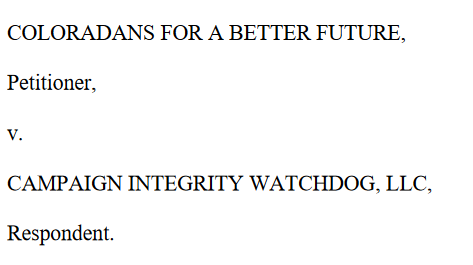The Center regularly provides pro bono representation to clients challenging the constitutionality of campaign finance laws and regulations. But the Colorado Court of Appeals held—in a published opinion—that uncompensated legal services provided to a political organization qualify as a “contribution” under Colorado campaign finance law. The holding of the court below created unintended consequences for groups defending against private complaints brought by ideological adversaries, for attorneys applying Colorado’s Rules of Professional Conduct, and for non-profit organizations operating pro bono legal centers.
Colorado’s Constitution authorizes private citizens to bring campaign finance enforcement actions. Colo. Const. art. XXVIII § 9(2)(a). The time, expense, and expertise needed to fight those complaints creates opportunities for harassment and a concrete need for attorneys willing to represent political actors. Given that many political organizations in Colorado are small and poorly resourced, reliance upon reduced-cost or pro bono legal counsel may be essential to a group’s defense.
By categorizing pro bono legal work as political contributions, the ruling assumes that pro bono work suggests an attorney’s support for a client’s political message. But Colorado Rule of Professional Conduct 1.2(b), and historical experience, are to the contrary. By counting pro bono representation as a “contribution,” the ruling impedes both the legal defense of politically-motivated claims and litigation vindicating constitutional rights.
Furthermore, the lower court’s ruling that pro bono legal services are “contributions” creates serious ethical problems for Colorado attorneys. Given the cost of legal representation in Colorado, few—if any—legal disputes can be resolved in the minimal billable time allowed by Colorado’s low contribution limits. Likewise, once an attorney enters a case, she is not permitted to withdraw merely for nominal nonpayment of fees, and may be required to continue to work pursuant to court orders, such as briefing schedules. The ruling creates a dilemma: violate the campaign finance laws by making too large a contribution, or impermissibly end representation of a client.
Finally, the ruling has strong implications for § 501(c)(3) nonprofit organizations providing pro bono legal representation, such as the Center. Under the Court of Appeals ruling, pro bono legal services would be reported in Colorado as supporting the committee in an apparent—but not actual—violation of the federal tax law, which prohibits “interven[tion] in…any political campaign on behalf of (or in opposition to) any candidate for public office.” 26 U.S.C. § 501(c)(3). Violating this prohibition carries severe penalties for the organization and its managers and employees. As importantly, even perceived violations of these laws is likely to draw legal complaints and other ill-informed attacks, while misleading the public as to the nonprofit organization’s true position.
Fortunately, this result is not commanded by Colorado’s Constitution or statutes. Article XXVIII, § 2(5)(b) specifically exempts “services provided without compensation by individuals volunteering their time” from the definition of “contribution.” The Fair Campaign Practices Act incorporates this exemption by adopting the constitutional definition of “contribution.” C.R.S. § 1-45-103(6)(a). Therefore, this Court may correct the erroneous ruling below, and forestall these grave harms.
Read Full Brief














